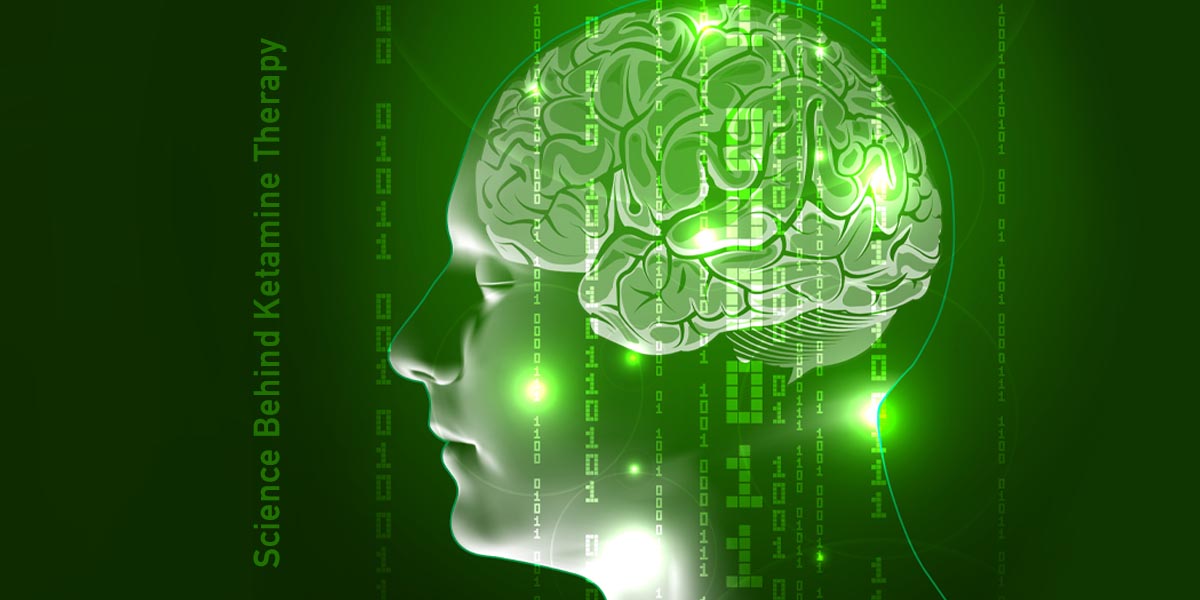Ketamine is a proven, powerful tool used to treat various mental health and behavioral conditions, including depression, anxiety, addiction, and post-traumatic stress disorder (PTSD). And because of its therapeutic value in a medically supervised setting, today ketamine-assisted therapy (KAT) is widely used in rehab facilities across the US.
If you haven’t heard of ketamine therapy before, or have never experienced a KAT session, we know there are many questions that you’re probably looking for answers to.
Understanding the science behind ketamine therapy and how exactly it works is crucial to making an informed decision about your treatment. We hope the following information gives you the knowledge you need about the healing benefits of ketamine therapy and how it can help you get the most out of your recovery journey.
Ketamine’s Physical Effects on Our Brains
Ketamine has been used as a sedative since the 1960s. Today, through the use of neuroimaging, or brain scans, scientists now know that ketamine can increase neural activity in many regions of the brain.
Depending on the dosage, ketamine manipulates how much, or how little, the brain’s nerve cells communicate to each other. At high doses, like those used in ketamine-derived sedatives, ketamine blocks the nerve cells, which is why it’s such an effective anesthetic. But in low doses, ketamine increases nerve cell connections, which helps repair broken neural pathways and create new ones. More neural activity, or connections, in the brain is a good thing. This can even help increase your overall brain functioning.
In fact, some studies show that “ketamine increases neural responses to positive emotions” and helps decrease hyper-awareness during negative experiences. In other words, by creating new brain connections, ketamine may actually help you shift your focus away from “the internal states of anxiety, depression.” It can also help you access emotions you may not have been aware of and see your situation through a new lens. That’s why research shows that ketamine can be a breakthrough treatment for severe conditions of depression and addiction.
Evidence Proving Ketamine Therapy’s Effectiveness
For the past several decades, scientific and medical communities have done extensive research on the benefits of ketamine in therapy:
Ketamine as an Antidepressant
Today, a large body of research proves that ketamine can be an effective treatment method for people with treatment-resistant depression.
One of the main benefits of ketamine is that it acts rapidly. This is different from conventional antidepressants, which can take several weeks to begin working. A 2010 study found that, in just 40 minutes, a single dose of ketamine reduced depression in participants with bipolar disorder. Another 2020 report concluded that ketamine significantly eased depression within 24 hours and continued to do so at 2-3 weeks of repeated treatment.
Scientists are still doing research to find out why ketamine seems to have such a pronounced effect. But the results are very promising. In March 2019, the FDA officially approved esketamine nasal spray – a derivative of ketamine – for treatment-resistant depression in adults, further proving the validity of ketamine as a treatment option.
Ketamine for Addiction Treatment
More recently, ketamine has been used to treat alcohol use disorder and other forms of addiction. One 2019 study found that, when combined with motivational enhancement therapy, a single dose of ketamine increased the likelihood of abstinence, reduced the likelihood of heavy drinking, and delayed relapse in participants who previously consumed five drinks per day. Another 2019 study reported that ketamine treatment decreased the likelihood of relapse in cocaine users, and substantially lowered their cravings.
Additionally, it’s been proven that a well-timed dose of ketamine can successfully stop the formation of maladaptive reward memories (MRMs). If a particular cue triggers you (i.e. a poster for beer), MRMs can cause your brain to crave a substance. This is one reason addiction can be so hard to overcome. This research shows that ketamine can inhibit this phenomenon, making addiction substantially easier to treat.
Science-based Holistic Ketamine Therapy
Ketamine affects different parts of the brain differently. So it makes sense that each person can respond to ketamine treatments differently as well. That’s why finding a personalized treatment program is so important.
At The Sanctuary at Sedona, all of our clients begin their healing journey by going through our intake evaluation process. First, our nurse practitioner and on-staff naturopathic doctor evaluate you for candidacy in our ketamine-assisted treatment program. If you decide to move forward with ketamine treatment, you’ll discover that the experience here is very different from your standard outpatient clinic.
In our holistic approach, we administer ketamine in an intimate group. This means no more than six clients receiving treatment at a time. The treatment session begins with an intention-setting ceremony in a warm, inviting atmosphere. We encourage you to focus on what you want to get out of the session. Immediately afterward, you’ll process your experiences with your peers in a sharing circle followed by a private dinner. And in the following days, your treatment team will monitor your progress throughout specific individual and group therapy sessions.
We combine the highest quality medical care with individualized complementary therapies. These include somatic healing, energy medicine, bodywork and more, to help you find healing in all levels of your being.
Is Ketamine Therapy is Right for You?
At The Sanctuary, ketamine therapy is far from being a standalone treatment in a doctor’s office. Our holistic program aims to help you release repressed emotions, gain perspective on your life, and unburden your psyche. And it all takes place in a supportive environment.
Contact us today for more information about The Sanctuary’s science-based, heart-centered ketamine treatment.
Dr. Forrest is a licensed Naturopathic Physician specializing in retreat-style holistic medicine, natural detoxification and cleansing, mind/body medicine, and regenerative medicine. Dr. Forrest brings to his work a sense of humility, respect, and compassion that is too often absent in the sterile, rigid world of modern medicine. He is deeply honored and grateful to be continuing this work as part of the community and healing that is taking place at the Sanctuary. [email protected]


